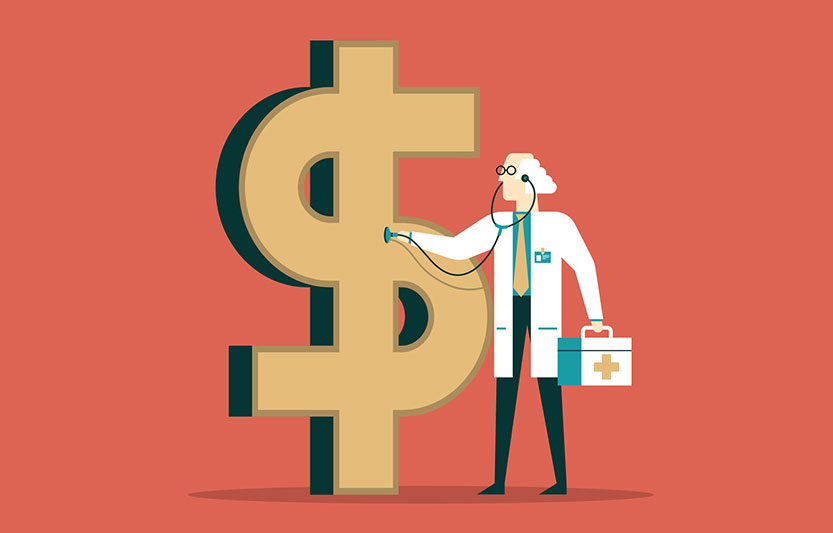
Dr. James Dahle is the author of the popular financial guide “White Coat Investor”.
In one of his blogs he lists the big mistakes medical – and dental professionals make in handling their finances.
- Poor debt management
This one begins when many dental students start working and get into the habit of living beyond their means. The debt servicing on student loans, car loans, and big house mortgages can cause a major drain on the practice cash flow. - Inadequate savings rate
Living within your means is very important. But to be truly successful, you need to live sufficiently far below your means that you can carve out money to invest, pay down debt, and build net worth.Saving 10% is the general rule for most people, but most people also have 40 years to save for retirement. Dentists only get 30 years, so they really need to be saving 15% if they plan to retire at 65. If you want to retire early, better bump that up to 20-25%. Remember that isn’t counting saving for your next car, that boat, a house down payment, or your children’s university education. That’s JUST retirement.
What keeps dentists from saving more? Debt is a big factor, as is a sense of entitlement after years of dental school and many long hours at work. But a major factor is the expectation in your own mind (and the mind of family and neighbors) that you need to live like a dentist. In short, you spend too much. Quit it. Like quitting smoking, it’s simple, but not easy. - Poor tax management
Dentists are well-known to make all kinds of stupid investments just to lower their tax bill. Yet far too many don’t take advantage of the simple tax saving strategies available to them. Some dentists are smart enough to learn about the Income Tax Act and do their taxes themselves. But finding a few bucks here and there at tax time is missing the forest for the trees. The big gains are found in changing your tax behavior throughout the year. Get yourself a good tax accountant who specializes in dental professionals. - Personal and Professional divorce
Starting over is expensive. There is nothing a dentist can do that will impact his finances as much as a divorce. It isn’t unusual for a dentist to lose his home, a large chunk of his savings, and his future income stream (to alimony and child support). It is hard to recover from that. The old adage, “One House, One Spouse” is still applicable. You can protect yourself from this in several ways. You can avoid marriage altogether; you can have a pre-nup agreement; and you can live your life to make your marriage relationship a priority.Breaking up with your partners, buying out your partner, closing the clinic, moving to another location are all expensive. You may have relocation expenses, employee costs, practice set up costs, and a temporarily lower income. Go into any business relationship with your eyes wide open, and have your contracts reviewed by an experienced lawyer.
- The wrong insurance
Not only do most people (dentists included) not have enough of the types of insurance they really need (primarily life, disability, and liability -professional and personal), they have too much of the types they don’t need. A quick reminder:Insurance you probably need (circumstances do vary):
- $1-$3 Million of 20-30 year level term life insurance
- $7500-15000/month of good quality, personal, own-occupation disability insurance
Insurance you probably don’t need:
- Cash Value life insurance (whole life, universal life, variable life, variable universal life etc.)
- Critical Illness insurance
- Expensive investments
In investing, you get what you don’t pay for. Many dentists pay 1-2% a year or more for investing advice, mutual fund fees or loads, commissions, management fees or other costs. The difference of 2% a year in an investor’s final net worth is astounding. Consider two dentists, both of whom invest $50,000 a year in similar investments. The first, however, minimizes his investment costs while the second accrues an additional 2% a year in costs. If they both make 5% after-inflation, but before costs, how much more does the first dentist have after 30 years? Nearly $1 million more ($3.32 Million to $2.38 Million). For a million bucks I think you can spend a little time learning about investing, shopping around for low-cost advice, and analyzing the true costs of your investments. If you add on another 30 years in retirement, the numbers get even worse. - Loaning money
We are not talking about buying T-Bills or savings bonds. We are talking about family and friends. You are “the rich dentist” so they come to you. Here is some news for you. You’re not rich. You can afford to help others out, but in general, make the money you hand to friends and family a gift, with no strings attached. This will do two things for you. First, it will preserve the relationship. A lender-debtor relationship is different than a family relationship, especially when the debtor goes into default. Second, it will preserve your money. Most of us are willing to lend much more money than we are willing to give. It’s far better to give away $10,000 than to lose $100,000 in loans.



